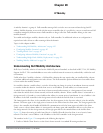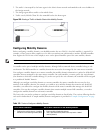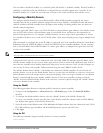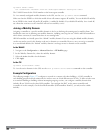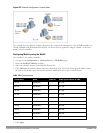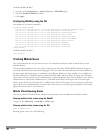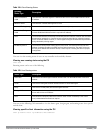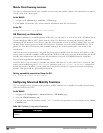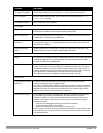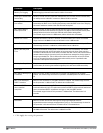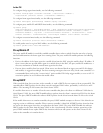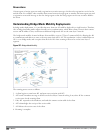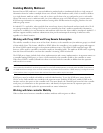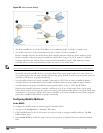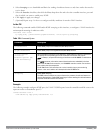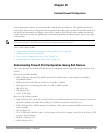
Parameter Description
Encapsulation Supported This parameter shows the type of encapsulation currently supported on the controller.
Clear Trail Entries
Clear the station location trail table. You can view entries in this table using the show ip
mobile trail command.
Clear Mobility Counters Clear counters for IP mobility statistics.
Foreign Agent
lifetime Requested lifetime, in seconds, as per RFC 3344, “IP Mobility Support for IPv4”. The range of
allowed values is 10-65534 seconds. The default setting is 180 seconds.
Max. Visitors Allowed Set a maximum allowed number of active visitors. The range of allowed values for this option
is 0-5000 visitors. The default setting is 5000 visitors.
Registration Requests
Retransmits
Maximum number of times the foreign agent attempts mobile IP registration message
exchanges before giving up. The range of allowed values for this option is 0-5 attempts. The
default setting is 3 attempts.
Registration Requests
Interval
Retransmission interval, in milliseconds. The range of allowed values for this option is 100-
10000 milliseconds, inclusive. The default setting is 1000 milliseconds.
Home Agent
Replay Time difference, in seconds, for timestamp-based replay protection, as described by RFC 3344,
“IP Mobility Support for IPv4”. 0 disables replay. The range of allowed values is 0-5000
seconds. The default setting is 5000 seconds.
Max. Binding Allowed Maximum number of mobile IP bindings. Note that there is a license-based limit on the
number of users and a one user per binding limit in addition to unrelated users. This option is
an additional limitation to control the maximum number of roaming users. When the limit is
reached, registration requests from the foreign agent fail which causes a mobile client to set
a new session on the visited controller, which will become its home controller.
The range of allowed values is 0-300 seconds. The default setting is 7 seconds.
Proxy Mobile IP
Trigger Mobility on Station
Association
If enabled, mobility move detection is performed when the client associates with the
controller instead of when the client sends packets.
This option is enabled by default. Mobility on association can speed up roaming and improve
connectivity for devices that do not send many uplink packets out that can trigger mobility. The
downside to this option is lowered security; an association is all it takes to trigger mobility,
however, this is irrelevant unless layer-2 security is enforced.
Stand Alone AP Support Enables support for third party or standalone APs. When this is enabled, broadcast packets
are not used to trigger mobility and packets from untrusted interfaces are accepted.
If mobility is enabled, you must also enable standalone AP for the client to connect to the
controller’s untrusted port. If the controller learns wired users via the following methods,
enable standalone AP:
l Third party AP connected to the controller through the untrusted port.
l Clients connected to ENET1 on the W-AP70.
l Wired user connected directly to the controller’s untrusted port.
When IP mobility is enabled, you must also enable the Stand Alone AP Support option so that
a tunneled node server can perform properly and display all wired users who are connected
to a tunneled node port.
DellPowerConnectW-SeriesArubaOS6.2 | User Guide IPMobility | 500



